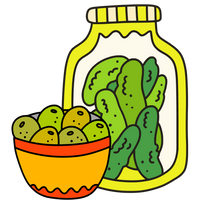
Probiotics have been having a moment, and for good reason! People are catching on that gut health is foundational for overall wellness, and probiotics play a primary role in supporting your microbiome.
If you’re ready to start taking probiotics and are curious about the benefits of probiotics, you may have questions about whether it’s best to eat fermented foods or to take probiotics in supplement form.
You might also be wondering, “Can you take too many probiotics?”
Let’s talk about it! We’re diving into probiotics, fermented foods for gut health, and how to know if you’re overdoing it on the good stuff.

Why Probiotics are Important for Gut Health
Your gut is kinda a big dill, and we’ve written about it extensively here at OMP. If you want a deep dive, check out these blog posts:
The short version is your gut is the control center for digestion, immunity, energy, skin and even mental health.
PS: Did you know that over 95% of serotonin is produced in the gut, while just 5% is produced in the brain? [1]
What Are Probiotics? And What’s Their Connection to Fermented Foods?
If you’re ready to support your gut health and immune function by creating a thriving, diverse microbiome, probiotics and ferments are the way to go!
Probiotics = beneficial bacteria (aka the good guys) and they support your gut microbiome, digestion, immunity, and even your mood.
You’ll find them in:
- Fermented vegetables – like pickles, sauerkraut, kimchi and our live-culture olives
- Probiotic supplements (more on those later)
- Other fermented foods like kefir and yogurt (but not all are created equal)
When you keep your gut microbiome balanced with daily probiotics, you're allowing the good bacteria in your gut to outnumber the bad bacteria, because when the opposite happens and the bad guys are in charge, it can lead to a number of health issues, including immune dysregulation. [2]
Aside from supporting immune function, a balanced gut really is the foundation to health and can even impact things like energy, sleep, heart health, and your skin!
Supplements vs. Fermented Foods: Who Wins?
Without a doubt, getting your daily dose of probiotics is essential to supporting your overall health through your gut microbiome. But so is how you take your probiotics.
Probiotics from fermented foods are far more beneficial than ingesting a supplement (it’s much tastier, too!).
Here’s why.
The thing is, with supplements, there is not any regulation on the market. You have no way of knowing for sure what is inside unless the company has done third party lab testing. Supplement pills also have synthetic ingredients made in a lab, and your body doesn’t always know how to absorb them. Not to mention they can be expensive and not exactly fun to “eat.”
Eating fermented foods allows your body to receive a diverse variety of natural probiotics that your body knows exactly how to absorb.
They’re also packed with all kinds of other nutrients such as Vitamins B, C, and K, iron, and zinc, and offer a much more delicious way to get in your supplements. And with our buy more, save more approach, they’re cheaper than paying for supplement pills – check out the cost comparison on our blog.
Learn more: Probiotic Supplements vs Probiotic Foods
Can You Eat Too Much of a Good Thing?
Now that you’ve made the decision to ditch the probiotic supplements (yay), you might find that your newfound love of crunchy, salty ferments has you reaching for handfuls of olives and garlic-y pickles all day long.
So the question becomes, can you eat too much of a good thing?
What happens when you suddenly begin eating too many fermented foods:
When you’re just starting out, diving headfirst into a bag of our Fermented Sauerkraut might leave you feeling like a balloon.
Why? Because your gut is adjusting to the influx of new bacteria. That might mean:
- Gas
- Bloating
- Extra…potty time
But don’t panic! These are just temporary signs that your gut is rebalancing. It’s not a red flag – it’s a recalibration.
Fermented foods for gut health should be introduced slowly and gradually, allowing you to work your way up to those handfuls of Live-Culture Garlic-Stuffed Olives you now crave on a daily basis (we listen, and we don’t judge).
Finding the Right Balance: What Does Science Say is Enough?
Studies show that regularly adding fermented foods to your diet positively impacts gut health and promotes a diverse microbiome. [3]
But what the studies don’t say is “eat this exact amount of fermented foods to improve gut health”, making it harder to define a maximum amount of probiotics you should be crunching on daily.
OMP’s Take: Enjoying Fermented Foods 3x Daily for Gut Health
While there’s no hard-and-fast rule, scient (and OMP wisdom) suggests this:
Go slow and steady.
Start with 1 serving a day, then work your way up. This will allow your body to adjust while avoiding gas, bloating, and discomfort.
Eat ferments with meals.
This helps your gut absorb all those enzymes and nutrients.
Mix it up.
Your microbiome loves variety – sauerkraut, olives, and maybe some spicy green beans for fun! We have 40+ options to choose from so you never get bored with ferments.
The OMP Way = 3x a day.
We recommend aiming for 3 servings of fermented foods daily for optimal gut support.

What Happens If You Eat Too Many Probiotics?
Even with food-based probiotics, it is possible to go too hard, too fast. Some signs to slow down:
- Persistent bloating or discomfort
- Frequent loose stools
- Stomach gurgles that embarrass you at work
If that’s you, back off a bit, then reintroduce slowly. Your gut needs time to adjust, especially if you were on a Standard American Diet (SAD) before.
Is it possible to take too many probiotics? Ultimate Answer…
Your gut is pretty smart. It will take what it needs and eliminate the rest, if ya know what we mean. Truthfully, when you’re dealing with natural probiotics in fermented foods, it’s pretty hard to “overdose” on them.
We recommend eating fermented foods 3x daily as a natural source of probiotics. But it is entirely possible that if you dive face-first into the world of fermented foods, taking too many probiotics may leave you with some temporary, uncomfortable side effects. No big deal, just ease back and work your way up!
Natural probiotics like our fermented pickles and sauerkraut support your gut health, and are highly beneficial for maintaining a diverse, thriving gut microbiome.
Ready to Start? Build Your Ferment Routine with OMP
Get your gut on track with a box of our fermented veggies. With 40+ options to choose from, we’ve got something for every taste bud.
References
- Banskota S, Ghia JE, Khan WI. Serotonin in the gut: Blessing or a curse. Biochimie. 2019 Jun;161:56-64. doi: 10.1016/j.biochi.2018.06.008. Epub 2018 Jun 14. PMID: 29909048.
- Wu HJ, Wu E. The role of gut microbiota in immune homeostasis and autoimmunity. Gut Microbes. 2012 Jan-Feb;3(1):4-14. doi: 10.4161/gmic.19320. Epub 2012 Jan 1. PMID: 22356853; PMCID: PMC3337124.
- Dimidi E, Cox SR, Rossi M, Whelan K. Fermented Foods: Definitions and Characteristics, Impact on the Gut Microbiota and Effects on Gastrointestinal Health and Disease. Nutrients. 2019 Aug 5;11(8):1806. doi: 10.3390/nu11081806. PMID: 31387262; PMCID: PMC6723656.
DISCLAIMER: THIS WEBSITE DOES NOT PROVIDE MEDICAL ADVICE
The content on this website is for informational or educational purposes only and does not substitute professional medical advice or consultations with healthcare professionals. Always seek the advice of your physician or other qualified healthcare provider(s) with any questions you have regarding a medical condition or treatment and before undertaking a new health care regimen.












